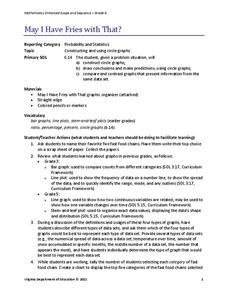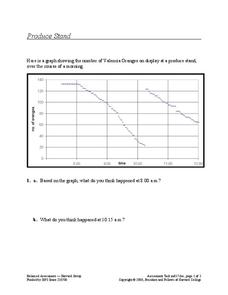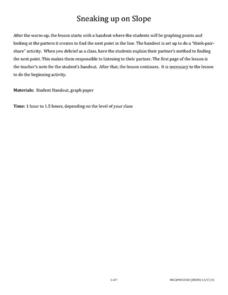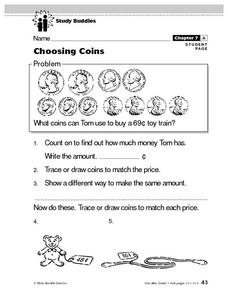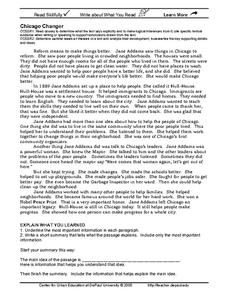Inside Mathematics
Squares and Circles
It's all about lines when going around. Pupils graph the relationship between the length of a side of a square and its perimeter. Class members explain the origin in context of the side length and perimeter. They compare the graph to the...
Virginia Department of Education
May I Have Fries with That?
Not all pie graphs are about pies. The class conducts a survey on favorite fast food categories in a instructional activity on data representation. Pupils use the results to create a circle graph.
Hampton-Brown
Esperanza Rising
Accompany a reading of the novel, Esperanza Rising by Pam Muñoz Ryan, with a series of lessons that dive deep into the literary world of a young girl and the journey she takes to start a new life. Lessons and their...
Bowland
Torbury Festival
Have you been to Torbury Fair? In the set of four lessons, learners solve a myriad of problems related to a music festival, including situations involving floods, market stalls, cows, and emergency plans.
Starry Night Education
The Year and Seasons
Turn your classroom into a live demonstration of how the earth and sun interact to create the four seasons. Using a globe, a light source, and a series of constellation cards, super scientists discover how the...
Balanced Assessment
Produce Stand
Interpret a graph of the number of oranges at a produce stand to determine a likely event at different times. They also analyze the graph to determine which time period oranges were selling most quickly.
EngageNY
Tax, Commissions, Fees, and Other Real-World Percent Problems
Pupils work several real-world problems that use percents in the 11th portion of a 20-part series. The problems contain percents involved with taxes, commissions, discounts, tips, fees, and interest. Scholars use the equations formed for...
Marine Institute
Water Pollution
Sixth graders investigate the various types of pollutants found in water and ways to help prevent water pollution. Through a hands-on experiment, students create samples of polluted water by mixing water with vegetable oil, dirt,...
It's About Time
Volcanos and the Atmosphere
In the summer of 1815, snow fell every month in New England. Was this related to the volcanic eruption of Tambora in Indonesia earlier in the year? Young scientists design their own experiments to research the long-term effect a volcanic...
West Contra Costa Unified School District
Sneaking Up on Slope
Pupils determine the pattern in collinear points in order to determine the next point in a sequence. Using the definition of slope, they practice using the slope formula, and finish the activity with three different ways to...
It's About Time
How Electrons Determine Chemical Behaviors
Lead the class on an investigation as they play detective and locate patterns in the electron arrangement of atoms. During the seventh lesson, they assign valence numbers to elements, organize the periodic table in the correct...
Mathematics Assessment Project
Functions
Studying function means more than simply learning a formula. Learners must use functions to think through four problems and find solutions. Each task utilizes a different concept from a study of functions. Class members might...
Balanced Assessment
Oil Consumption
An assessment presents a chart displaying oil consumption Pupils use the chart to determine the greatest increase in consumption, and then apply that information to figure out when the consumption may reach 100 million barrels a day.
Noyce Foundation
First Rate
Explore distance and time factors to build an understanding of rates. A comprehensive set of problems target learners of all grade levels. The initial problem provides distance and time values and asks for the winner of a race. Another...
Royal Society of Chemistry
Some Reactions of Carbon Dioxide—Microscale Chemistry
Precipitation reactions are always interesting. How about one that forms a precipitate using a gas? Chemists of any age will enjoy this twist on a standard solubility lab. Partners observe the lack of interaction between sodium...
Curated OER
4-H Advanced Food Science Activity Pages
In this 4-H food science worksheet, learners examine how food works in the body, find out about food preservation methods, and investigate careers in the food industry. They complete a word search, practice food photography, answer true...
Curated OER
Parts of Speech: Adjectives
What is an adjective? Read the informational paragraphs before having your elementary learners take the 10-question quiz. Learners distinguish between a group of words to find the adjective. Possessive adjectives and plural adjectives...
Curated OER
Plant Structure and Function
With a few minor formatting changes, the plant parts and processes resource here would make a great study guide, quiz, or self assessment. Currently, it is a bit confusing, but changing some lettering to numbering would clear up any...
Curated OER
Choosing Coins
In this mathematics worksheet, 1st graders identify what coins can be used to buy a toy train. Then they count out how much money is given and write that amount in cents. Students also trace or draw the coins to match each price listed.
Curated OER
Acids and Bases
In this acids and bases worksheet, students review the characteristics of acids and bases, pK values, factors that change the rate of reactions, and catalysts. This worksheet has 17 multiple choice questions.
Curated OER
Absolute Value
In this absolute value worksheet, students solve 20 different problems related to absolute value of equations. They define absolute value as the distance to the origin on a real number line. Students then get rid of the brackets by...
San José State University
Avoiding Nominalization
Improve syntax with this explanatory handout. It clarifies one way to make writing more precise: avoiding nominalization. This resource provides four ways to find and change nominalization problems and 10 sentences to correct. There are...
Illustrative Mathematics
Equivalent Expressions?
Pre-algebra pupils need to understand that two expressions are only equal if they have the same value. Show them that once the expression is multiplied by a number, the value of the expression changes. It makes for a good lead-in to...
DePaul University
Chicago Changer: Jane Addams
The power of a single person to change a community is amazing. Read about about how Jane Addams witnessed people living terrible lives in Chicago and chose to do everything she could to help them. When finished, young learners identify...
Other popular searches
- Making Change Worksheets
- Adding Money Making Change
- Making Change Lesson
- Money Making Change
- Making Change Math Center
- Real Life Math Making Change
- Money Shopping Making Change
- Making Change From $1
- Making Change From $1.00
- Making Change Counting Up
- Money and Making Change
- Canadian Money Making Change



